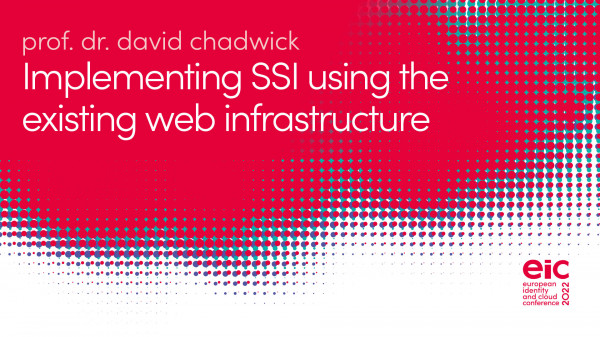Many companies are engaging in remote onboarding and need to adopt new methods of identity verification that can be done digitally. While new forms of ID verification are most prevalent today with Financial Services as a means of performing Know-Your-Customer regulations, there is nascent adoption across other industry verticals. In this session, the speakers will demonstrate an open standard based approach to ID verification based on verifiable credentials and decentralized identifiers for remote onboarding across industries. With this new approach users can verify their identity once and use their credentials with any organization. Enterprises can leverage this simpler cost-saving approach to remotely onboard employees, partners and customers compliantly while respecting the end users’ privacy.

SSI and Verifiable Credentials are the latest development in identity management. They offer many benefits over existing federated identity management systems. Unfortunately some proponents of SSI are mandating that companies implement decentralised identifiers (DIDs) and blockchains in order to benefit from SSI. This is not necessary. In fact the W3C Verifiable Credentials Data Model Recommendation makes it clear that DIDs are not needed for verifiable credentials, and vice versa. DIDs and blockchains are something of a ball and chain around the legs of companies that want to benefit from SSI when leveraging their existing web based security infrastructures. This keynote talk will describe how it is possible to build standards compliant high performance, user friendly, SSI systems using the World Wide Web, Transport Layer Security, Jason Web Tokens, Web Authentication and X.509 public key certificates, allowing them to experience all the benefits of SSI without the ball and chain impediments of DIDs and blockchains. - the benefits of SSI over existing identity management systems - the downsides of DIDs and blockchains - the upsides of using existing World Wide Web infrastructure to build your SSI solution

Learn how businesses are using verifiable credentials, decentralized orchestration and blockchain identity to reduce fraud, increase privacy and improve user experience. See real-world examples of production ready solutions from one state’s Department of Education and other public sector organizations. Learn how biometrics, proofing, KYC and other MFA services link with verifiable credentials through decentralized orchestration. See how paper-based documents like diplomas, academic transcripts and citizen identity are being replaced with verifiable credentials that reduce cost, increase security and privacy preservation. Learn how Ping Identity and other sources can issue and verify blockchain based verifiable credentials.
